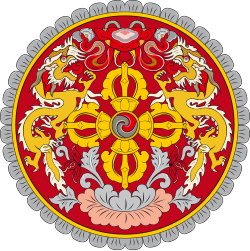Parliament of Bhutan
Parliament of Bhutan རྒྱལ་ཡོངས་ཚོགས་ཁང་ gyelyong tshokhang | ||
|---|---|---|
| Fourth Parliament | ||
National Council political groups | (20)
Appointed (5) | |
National Assembly political groups | Government (30)
Opposition (17)
| |
| Authority | Article X, National Assembly election | 30 November 2023 and 9 January 2024 |
| Meeting place | ||
| Gyelyong Tshokhang, Thimphu | ||
| Website | ||
| National Council of Bhutan National Assembly of Bhutan | ||
 |
|---|
The Parliament of Bhutan (
in 2007, with the first members taking seats in 2008.Composition of Parliament
The
The
The Constitution sets forth the procedure of the formation of the executive branch and its ministries, including the post of
The
Parliamentary powers and procedure
The National Council and National Assembly operate under a framework of enumerated substantive powers and duties under the Constitution.[1] In addition, the procedural framework of each body is codified independently in subsequently enacted legislation: the National Council Act[2] and the National Assembly Act.[4] The Acts define operating procedure (such as quora and voting) and delegation of duties to committees much like bylaws; the Acts themselves also provide some incidentally related substantive law, such as offenses and penalties for officeholders.[2][4]
Legislative powers of Parliament
Foremost among the powers and duties of Parliament is the passing of bills. Either the upper house
Other powers of Parliament
Parliament has the sole authority to alter Bhutan's international territorial boundaries, and internal Dzongkhag and Gewog divisions, with the consent of at least 75% of the total number of members (currently 54).
The Constitution provides that the National Assembly may, with support of at least two-thirds of its members (currently 32), motion of no confidence in the Government. If the vote passes, the King shall dismiss the Government.[nb 16]
Notes
- ^ Constitution: Art. 1, § 3; Art. 10
- ^ Constitution: Art. 11; Art. 12
- ^ Constitution: Art. 11
- ^ Constitution: Art. 12
- ^ Constitution: Art. 17, § 1
- ^ Constitution: Art. 17, § 2
- ^ Constitution: Art. 17, § 3
- ^ Constitution: Art. 17, §§ 4, 5
- ^ Constitution: Art. 13; Art. 35
- ^ Constitution: Art. 13, § 2
- ^ Constitution: Art. 13, §§ 8, 9
- ^ Constitution: Art. 13, § 5
- ^ Constitution: Art. 13, § 5
- ^ Constitution: Art. 13, §§ 10, 11
- ^ Constitution: Art. 1, § 4
- ^ Constitution: Art. 7, §§ 6, 7
See also
- National Council of Bhutan
- National Assembly of Bhutan
- Bhutanese legislation
- Elections in Bhutan
- Politics of Bhutan
- List of legislatures by country
- Bicameralism
- Tshogdu
References
- ^ a b "Constitution of the Kingdom of Bhutan (English)" (PDF). Government of Bhutan. 2008-07-18. Archived from the original (PDF) on July 6, 2011. Retrieved 2010-10-13.
- ^ Government of Bhutan. 2008. Retrieved 2011-01-02.[permanent dead link]
- ^ Government of Bhutan. 2008-07-28. Archived from the original(PDF) on June 17, 2024. Retrieved 2011-01-30.
- ^ Government of Bhutan. 2008-08-12. Retrieved 2011-01-02.[permanent dead link]
- Government of Bhutan. 2006-06-30. Archived from the original(PDF) on 2012-04-24. Retrieved 2011-01-23.
- Government of Bhutan. 2009-09-11. Archived from the original(PDF) on July 6, 2011. Retrieved 2011-01-20.
External links
- "National Council of Bhutan Online". Government of Bhutan. Retrieved 2011-02-08.
- "National Assembly of Bhutan Online". Government of Bhutan. Retrieved 2011-02-08.
- "Constitution of the Kingdom of Bhutan" (PDF). Government of Bhutan. 2008-07-18. Archived from the original(PDF) on July 6, 2011. Retrieved 2010-10-08.
